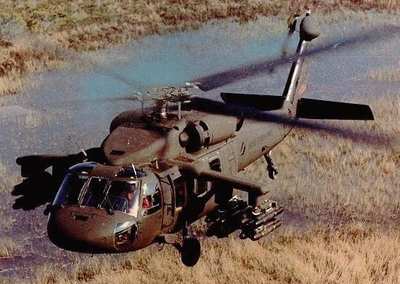INSECT Designed Help Helicopter Pilots Avoid Hazards, Crashes In Obscured Conditions
A simulator-based training system designed to enhance the perceptual skills of helicopter pilots has been developed by Aptima in conjunction with the U.S. Naval Air Systems Command (NAVAIR). INSECT, the Intuitive Navigation System for Effective Collision-avoidance Tactics, is designed to train pilots to maintain awareness of their surroundings and operate more safely in degraded visual environments such as dust, snow, and sandstorms.

INSECT was developed to help pilots of UH-60 Black Hawk (pictured in file photo) and other aircraft capable of vertical/short takeoff and landing (VSTOL) to “see through the debris” and pick out critical visual cues to avoid hazards such as buildings, power lines, and enemy fire when flying in degraded visual conditions.
“In a whiteout or brownout it can be nearly impossible for a pilot to establish awareness and gauge if the ground contour is safe to land, not veer into overhead lines, or determine whether someone is waving for assistance or aiming a missile,” said Courtney Dean, Aptima’s INSECT program manager. “Pilots must be able to pick out very subtle cues in poor conditions to avoid danger.”
The Aptima team applied a novel, multi-disciplinary approach to insect vision research, theorizing that pilots undergoing perceptual skills training would be better equipped to identify and safely navigate around, or away from hazards in degraded visual environments. The team included Dr. Thomas Schnell, Associate Professor and Director of the Operator Performance Laboratory at the University of Iowa, and Troy Zeidman of Imprimis, a former U.S. Army Black Hawk helicopter pilot.
Flying in a high-fidelity simulator, the trainee is challenged to navigate and conduct missions through varied terrain, from high altitude, snowy mountains, to sand and dust-shrouded cities. INSECT helps the pilot become aware of and understand the different obstacles and risks encountered using a system of perceptual cues that support pilot situation awareness. An obstacle reaction boundary (ORB) that outlines a building, for example, would expand around the structure as the helicopter nears, showing the physical reaction boundaries and safe passage zones. Icons pulse faster to indicate the rate of closure, and change colors as the threat of collision escalates.

“INSECT is a clever trainer that applies an understanding of how insects gather and process visual data. Because human pilots face different types of sensory cues, we devised a hybrid symbology to help develop their visual perception and ability to recognize critical clues,” added Dean.
INSECT uses a scaffolding training schedule, which systematically increases the complexity of the scenarios, while simultaneously reducing the support cues. As it measures the pilot’s abilities, INSECT’s algorithms adjust to the trainee’s strengths and weaknesses, selectively removing the visual aides as they advance through more difficult exercises. This develops the trainee’s ability to visually ‘read’ and navigate complex and unforgiving environments under difficult operational conditions.
“The system is designed for a wide range of risks, not just for military operations in the Middle East,” added Dean. “Even civilian pilots flying in good visual conditions face unique challenges. In urban areas, power lines and other wires may be obvious from the ground, but they can be nearly invisible from the air when traveling at 80 or 100 knots.”
INSECT seeks to enhance existing training by actively providing specific perceptual skills training that help pilots learn to avoid hazards, in addition to absorbing these skills as part of other training exercises. INSECT can help prepare pilots for more specialized, pre-deployment training that includes flying actual exercises with experienced senior pilots, supplementing live exposure training with a safer, less time-consuming, and cost effective simulation environment.
 ANN's Daily Aero-Linx (04.16.24)
ANN's Daily Aero-Linx (04.16.24) Aero-News: Quote of the Day (04.16.24)
Aero-News: Quote of the Day (04.16.24) Airborne 04.10.24: SnF24!, A50 Heritage Reveal, HeliCycle!, Montaer MC-01
Airborne 04.10.24: SnF24!, A50 Heritage Reveal, HeliCycle!, Montaer MC-01 Airborne 04.12.24: SnF24!, G100UL Is Here, Holy Micro, Plane Tags
Airborne 04.12.24: SnF24!, G100UL Is Here, Holy Micro, Plane Tags Airborne-Flight Training 04.17.24: Feds Need Controllers, Spirit Delay, Redbird
Airborne-Flight Training 04.17.24: Feds Need Controllers, Spirit Delay, Redbird




